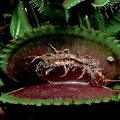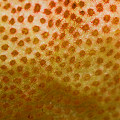Q: What digestive acids do they make, and are they dangerous?

Dionaea muscipula

Nepenthes ventricosa
digestive glands
A:
The trick with this answer is that carnivorous plants do not make
"acids", at least in the sense of
stick-your-finger-in-and-watch-it-corrode. The compounds that carnivorous plants
make to digest food are quite mild. They are digestive enzymes which dissolve
the protein in the prey. Weak enzymes.
The enzymes that have been detected in
carnivorous plants include amylase, chitinase, esterase, lipase, peroxidase, phosphatase, protease, and ribonuclease.
The enzymes responsible for digestion in
Nepenthes have not really been isolated, but there are studies underway
(as there have been for years) to understand them better. If you are really insane about trying to find out more, refer to
the citations I have below. If you need me to look this information up for your school report, I haven't got the
time. Go to the library and read Barthlott et al. (2007) for yourself. Page 42 should
help.
Do not overlook the previous FAQ entry, which mentions how some carnivorous plants
impress organisms like bacteria and much larger creatures to help perform the
digestive tasks.
Page citations: Barthlott, W. et al. 2007;
Juniper, B.E. et al. 1989; Parkes, D.M. 1980; Schnell, D.E., 2002a;
Takahashi, K. et al. 2008; Thornhill, A.H. et al. 2008.